Community
An interview with Millie Marotta
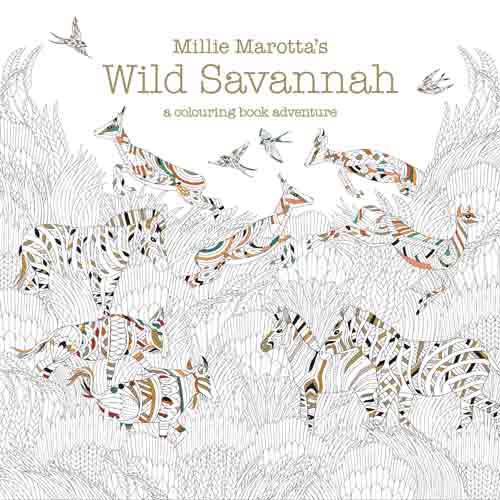

‘Wild Savannah’: Millie Marotta’s brand new colouring book
PIONEER for the adult colouring book craze Millie Marotta spoke with The Herald last week (Feb 17), a few days after she released her latest collection, ‘Wild Savannah’.
Millie Marotta is the UK’s best-selling non-fiction author of 2015, the NY Times Bestselling author and her book, ‘Animal Kingdom’, spent a record 20 weeks as the official paperback non-fiction number one on Amazon.
On February 11, the Pembrokeshire-based artist released her third book, ‘Wild Savannah’, which offers beautiful and intricate illustrations of the Savannah grass lands. The colouring book is already being flagged as one of the biggest releases of 2016.
Speaking with Millie last week, she said that she has adored art for as long as she can remember and that she has always gravitated towards creative activities.
After studying Art and Design in school, she went on to do a degree in Wildlife Illustration and then became a teacher at Bush School, where she taught for a number of years.
In 2008, when the economy was taking a down turn, Millie decided to take the plunge and leave her stable, well paid job to become a freelance illustrator.
“I was really scared,” she told us, “People were like, ‘Oh my gosh, are you a bit mad?’ but I felt like it was the right time.
“I always carried on with my own projects outside of my job and my desire grew and grew. Teaching over time and nurturing other people’s creativity made me miss being more creative myself.
“My plan was to do freelance illustration and I had to make it work. I was deadly serious about it – I made sure it was going to work. It was really scary and it was a bold move, but it worked out.”

Millie Marotta: “Colouring is an easy way to be creative.”
We asked Millie whether she planned to create colouring books from the beginning, or if her art style paved the way for her.
Before creating her colouring books, Millie worked on a variety of different projects; textiles, food packaging, book illustrations, editorial… The list goes on.
Millie told us that her publisher’s had seen her work a year before they got in contact with her. The publisher’s had bought a screen print of the artist’s work to give to a colleague who was leaving their office.
A year later, they contacted Millie proposing the idea for an adult colouring book because her style of art seemed perfect for the craze.
“We met for a chat first of all and it seemed like a great idea – it made sense. I took in some drawings, which I thought would be good for the book and we had similar ideas.
“It all happened so quickly. I came away from the meeting and started drawing for my first colouring book the next day.”
We asked Millie whether she plans her books before starting. She replied: “I plan quite meticulously; I don’t make it up on the spot.
“My books are planned really well so that there is plenty of diversity. There are lots of different types of drawings; when you’re drawing in excess of 80 pieces, it’s important to think abou it carefully so that the whole book is beautiful and engaging.”
Millie told us that she is not one to wander around and she works best when she is in her studio. As her work is so meticulous and accurate, the artist likes to work at home in her usual, relaxed environment, at a desk surrounded by materials she loves to work with.
She draws every day, whether she is planning pieces as little thumbnails or creating a very accurate and precise final piece. Drawing is the largest portion of Millie’s day.
All of Millie’s work is nature based, and the natural world is what inspires her. She said: “I’ve always been fascinated by the natural world, it’s an inherent thing and it seems obvious for me to focus on it. I don’t have to think about it.”
Fellow artists who create nature-based pieces are the people who inspire Millie most. The artist loves Charlie Harper’s flat, clean stylised graphics and the intricate and scientific work of Ernst Haeckel. Millie went on to talk about Pembrokeshire artist John Knapp Fisher, whose monochrome style has always been an inspiration to her.
“Why do you think adult colouring books have become so popular?” we asked.
“Overall, it’s down to the fact that we all lead such busy lives. We cram so much into a day and there comes a time when we need to shut out the outside world.
“People need a simple and accessible way to be calm – to concentrate one thing instead of 100.
“Colouring is something we’ve all done as children, so it isn’t a new hobby, it’s inherent in all of us. There’s an element of nostalgia and familiarity.
“We kind of leave colouring behind – as children we love to be creative, but life takes over and we don’t allow ourselves time to engage in creative activities. Colouring is an easy way to be creative.”
We asked Millie what advise she would give to anyone thinking of pursuing a career in art. She told us that the most important thing is to take time to develop your own style.
“The illustration world is a busy market and it’s easy to look at other people and try to work like them.
“It’s important to do what comes naturally to you because your work is then honest and genuine. This makes you stand out and you will produce better work.”
Millie is already working on book number four, which will be released later this year, and is about to release a homeware range, which she tells us is “new and exciting” for her.
The artist is incredibly busy, but she’s happy to be – she tells us she would be doing this much even if she did not have deadlines to meet.
Millie has also recently become a patron for the Born Free Foundation, a charity whose aim is to keep wildlife in the wild. Funding for the charity goes towards stopping the suffering of wild animals and protecting threatened species in the wild.
By selling a limited edition print of the lion piece in Millie’s new ‘Wild Savannah’ book, the artist will help to raise money for the charity, and raise awareness while doing so. The print will be sold exclusively on the Born Free Foundation’s website.
Millie told us that she cannot wait to do more work with the charity in the future.
You can now buy Millie’s latest book, ‘Wild Savannah’ in most good book stores and online, and we at The Herald suggest you do that right away.


Community
Angle RNLI assist medical incident in Neyland
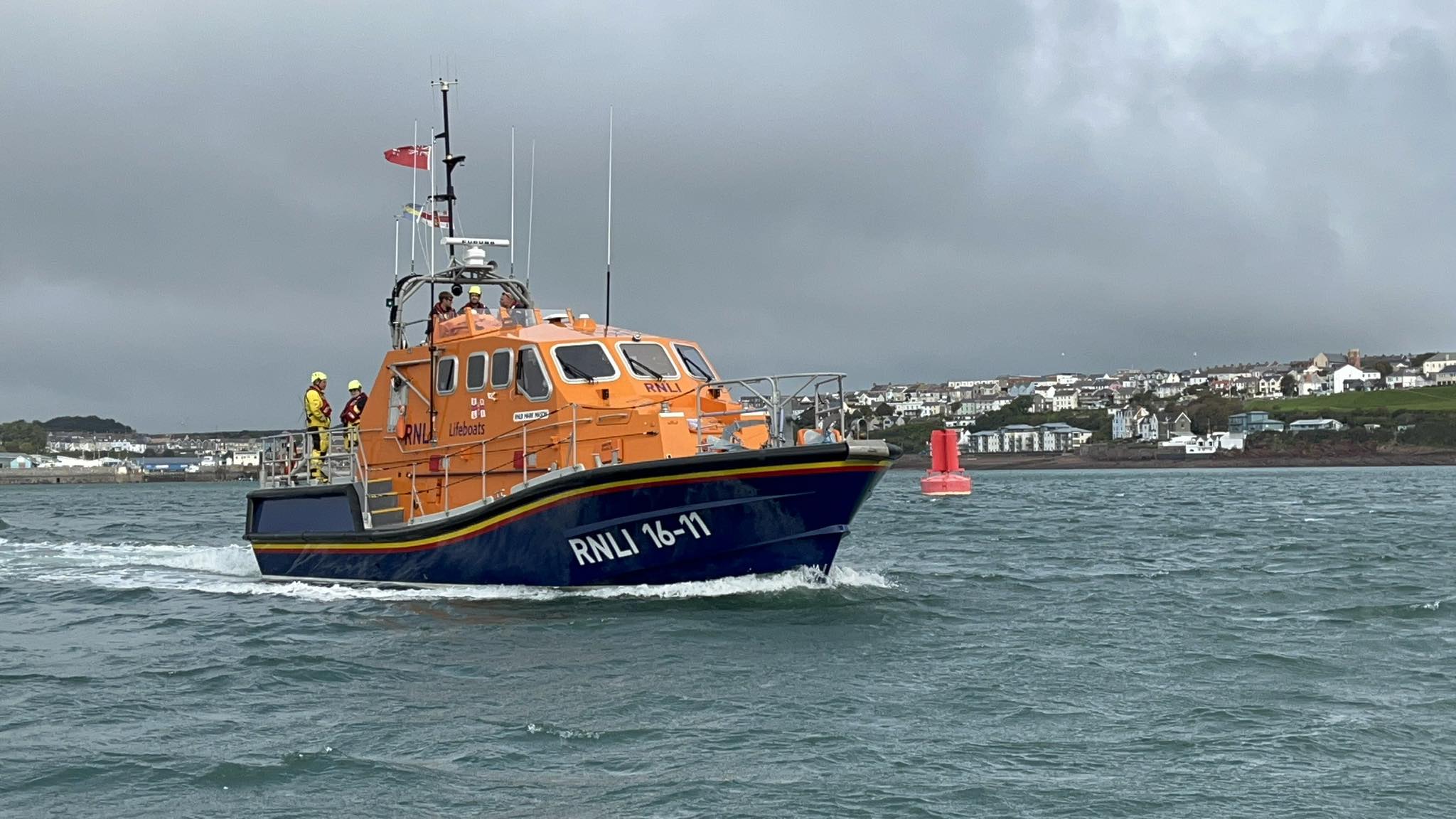
Volunteers diverted mid-exercise to help casualty at slipway
CREW from Angle RNLI were called into action yesterday afternoon after being diverted from a training exercise to assist with a medical emergency at Neyland Slipway.
The all-weather lifeboat was afloat on an extended navigation exercise when the request for assistance came in at 2:44pm. At the time, the crew were operating off Milford Shelf and immediately made best speed towards Neyland.
On arrival, the lifeboat’s inflatable Y-boat was launched, allowing casualty care-trained volunteers to reach the shore quickly. Crew members assessed the casualty and provided immediate assistance while coordinating with emergency services.
Working alongside Dale Coastguard Rescue Team and the Welsh Ambulance Service, the volunteers helped safely extract the casualty from the slipway and transfer them for further treatment.
Once the incident was concluded, the lifeboat was stood down and returned to station, where it was cleaned, refuelled and readied for service again by 4:30pm.
A spokesperson said the call-out highlighted how quickly routine training can turn into a real-life rescue, with crews ready to respond at a moment’s notice.
Community
Valentine’s Day farewell for much-loved scaffolding firm boss
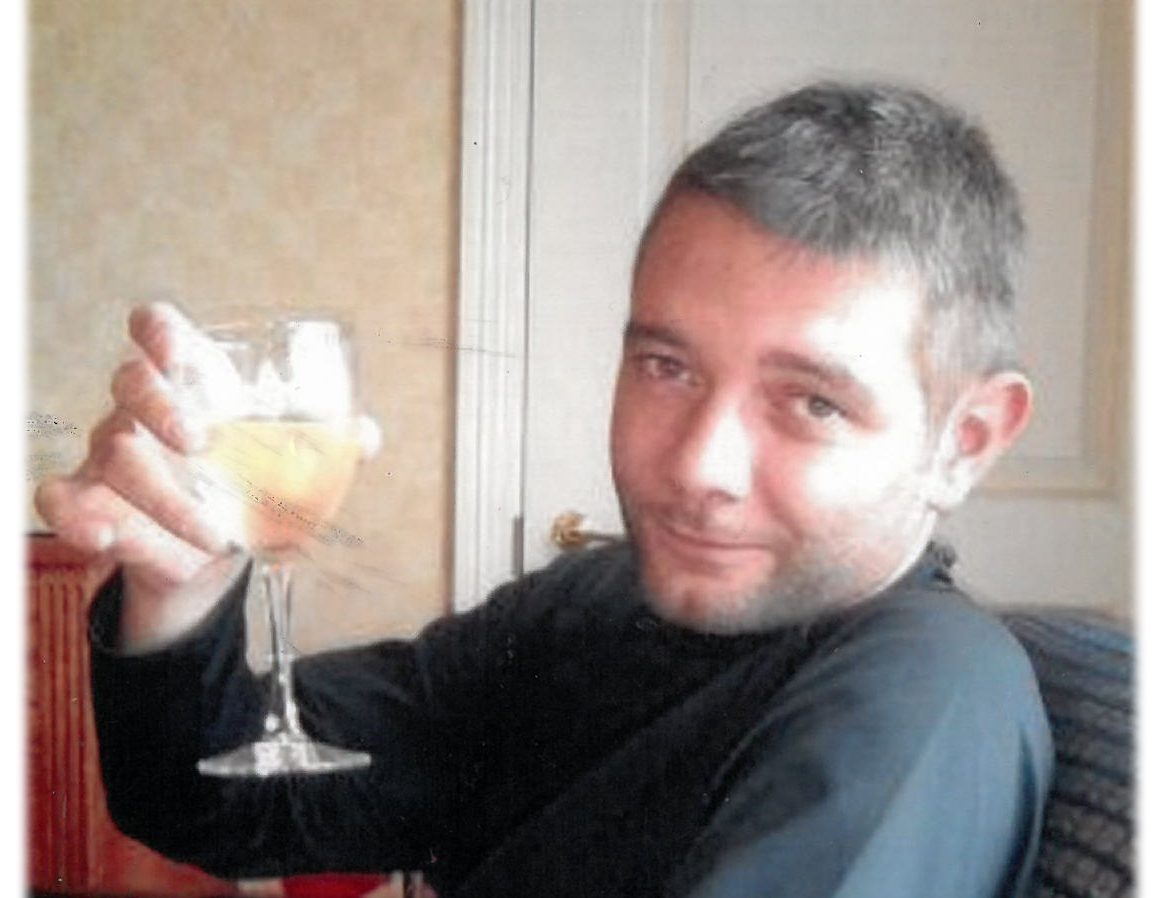
Community to gather for Jozef Polak’s funeral after sudden death in Cyprus
THE PEMBROKESHIRE community will come together on Valentine’s Day to say a final goodbye to much-loved scaffolding firm boss Jozef Mcleod Polak, who died suddenly while abroad.
Jozef, aged 41, of Johnston, passed away unexpectedly in Cyprus on January 14, leaving family, friends and colleagues devastated by the loss.
Well known through his business, JP Scaffolding, and his long-standing support for local causes and sport, he was widely described as a warm-hearted, larger-than-life character who would help anyone without hesitation.
Tributes poured in within hours of the news breaking.
“My best mate… taken too soon,” wrote Adam Rogers. Timothy Jones added: “Sad news. RIP mate,” while Gareth Williams said: “RIP Joe thoughts with all the family.”
Others spoke of his humour and generosity. Ginge Davies said: “Rip JP truly a great guy… a complete nutter with a heart of gold… he was such a good laugh.”
Friends who had known him since childhood remembered a polite and kind young man. Simon Narbett said: “Spent many weekends around our house as a kid in Johnston… always very polite and well mannered boy, nice family too. RIP Jozef.”
The sense of shock was clear across social media, with many saying the news was hard to believe.
Jozef was also a long-standing supporter of The Pembrokeshire Herald, advertising regularly and remaining a valued customer for more than a decade. The Herald team worked with him on a number of stories over the years, including coverage linked to the collapse of Mustang Marine which affected several local contractors.
At Johnston Football Club, where he was a familiar and trusted figure, tributes described him as a “club legend”.
The club said his connection stretched back years through family sponsorship before he stepped up his own involvement around 2012 — a period that saw Johnston enjoy one of the most successful spells in its history, including lifting the West Wales Cup.
His backing was practical as well as financial. Over the years he helped provide more than 20 senior kits, along with junior and minis kits, balls, training gear and tracksuits. He also stepped in to help with maintenance work around the ground.
“We never had to ask twice,” the club said, adding that in recent years it became routine to call him whenever something needed sorting. “He’d simply ask, ‘How much do you want?’”
Family and friends will now gather to pay their respects at Parc Gwyn Crematorium, Narberth, on Saturday, February 14 at 1:00pm.
Family flowers only are requested. Donations in Jozef’s memory may be made to NSPCC, supporting the charity’s work protecting children.
For many in Johnston, his passing leaves a gap that will be hard to fill — a familiar face, a generous supporter, and, as one friend put it simply, “one of the good ones.”
Community
Murals legacy honoured at Town Hall
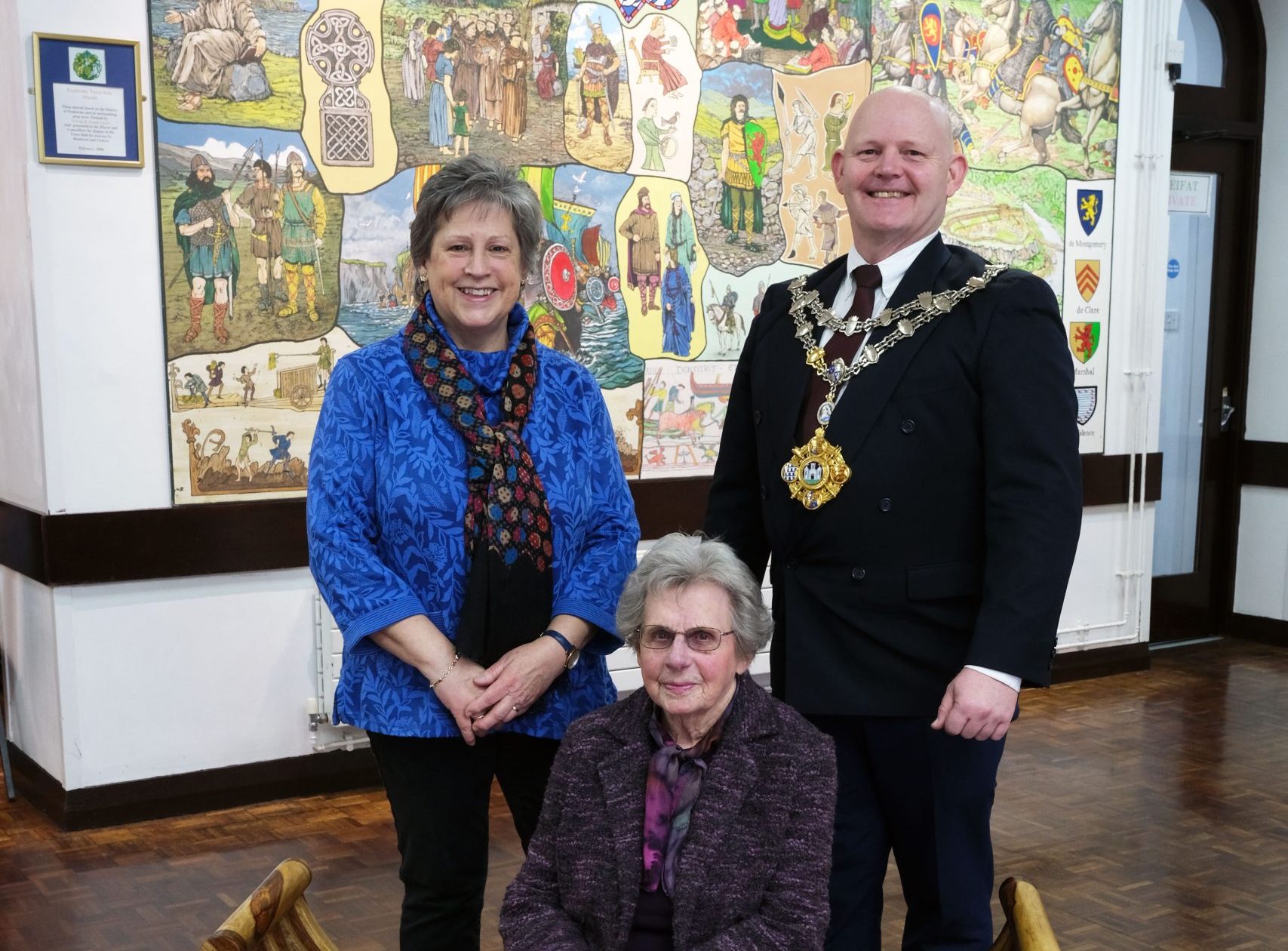
Artist Jeanne Lewis recognised as Pembroke celebrates 20 years of historic artwork
MRS JEANNE LEWIS and her daughter were guests of honour at a special presentation at Pembroke Town Hall on Tuesday to mark the 20th anniversary of the historic murals installed inside the building.
Two handcrafted benches, gifted by Pembroke Town Council, were presented in appreciation of the artwork created by Jeanne and her late husband, George Lewis, whose striking panels have become a defining feature of the Hall over the past two decades.
The murals, which vividly depict scenes from Pembroke’s past, have long drawn praise from residents and visitors alike for their scale, colour and intricate storytelling.
The Mayor of Pembroke, Gareth Jones, joined councillors and volunteers from Pembroke Museum to present Mrs Lewis with a Certificate of Appreciation and a bouquet of flowers in recognition of the couple’s lasting artistic legacy.
Councillor Jones said the town was “extremely fortunate and deeply privileged” to house the collection.
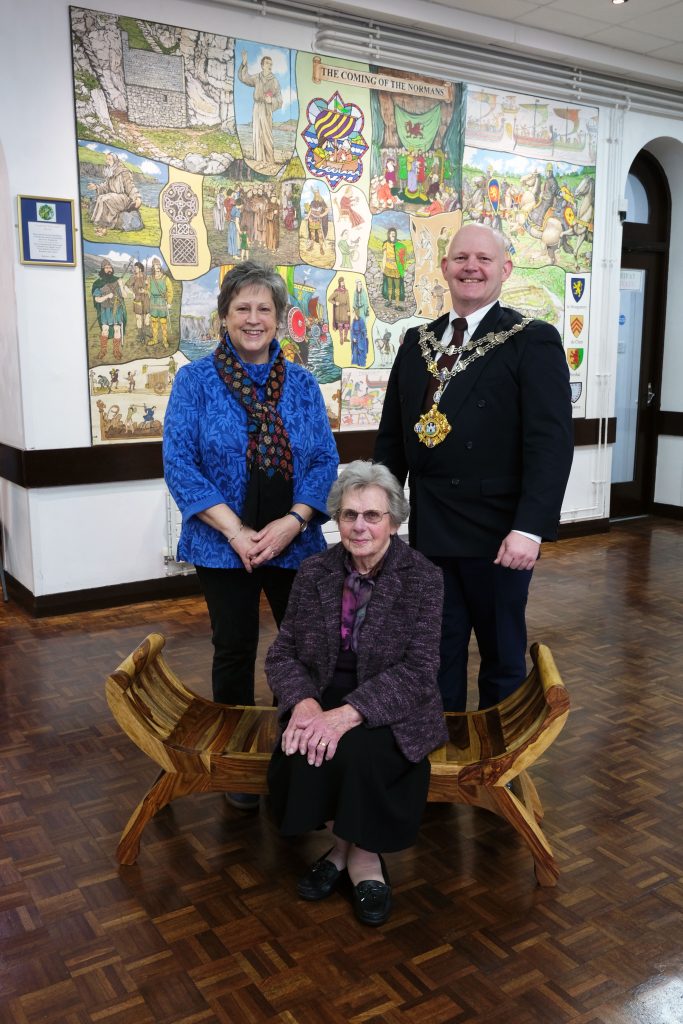
He added: “People often walk into the Town Hall and simply stop to look. The detail and the history captured in these murals are remarkable. They give visitors a real sense of Pembroke’s story and reflect the dedication and talent Jeanne and George brought to the project.”
Twenty years on, the artwork continues to enrich the civic building, ensuring the Lewis family’s contribution remains at the heart of the town’s heritage.
Photo caption: Jeanne Lewis receives a certificate from Mayor Gareth Jones at Pembroke Town Hall, marking 20 years since the installation of the town’s historic murals (Pic: Martin Cavaney/Herald).
-

 Health7 days ago
Health7 days agoConsultation reveals lack of public trust in health board
-

 Crime16 hours ago
Crime16 hours agoSex offender jailed after living off grid in Pembrokeshire and refusing to register
-

 News2 days ago
News2 days agoPrincess of Wales visits historic Pembrokeshire woollen mill
-

 Crime6 days ago
Crime6 days agoPembroke man accused of child sex offences sent to Swansea Crown Court
-

 Health4 days ago
Health4 days agoDoctor struck off after sexual misconduct findings at Withybush Hospital
-

 Community6 days ago
Community6 days ago50s women threaten legal action over pension compensation refusal
-

 Business7 days ago
Business7 days agoEight-year prison sentence after vehicle stop uncovers drugs worth over £150,000
-

 Crime2 days ago
Crime2 days agoHakin man’s appeal delayed again as Crown Court seeks guidance on insurance law

























